When an industry can change in what feels like the flash of a pixel, preparing to work in it may seem an adventure into a strange new future.
Middle Tennessee State University’s Department of Media Arts is looking beyond graduation for its students by teaching them new ways to turn ideas into new realities on the screen.
 This fall, on the new extended reality, or XR, stage in the university’s Bragg Media and Entertainment Building, classes will prepare students from the department’s animation and film and TV production programs to reach new heights in virtual production for film, TV and animation.
This fall, on the new extended reality, or XR, stage in the university’s Bragg Media and Entertainment Building, classes will prepare students from the department’s animation and film and TV production programs to reach new heights in virtual production for film, TV and animation.
It’ll be a full XR-capable facility, a roughly $1 million investment that’s the only one at a Tennessee university and among only a few such facilities at any university anywhere.
The students will be able to produce work that looks like it was shot anywhere — real or imagined — just like the creators and crews of films like “Dune” and TV shows like “The Mandalorian” that rely on XR technology to create vast worlds on a soundstage.

Billy Pittard
“Whenever a major new platform comes along, college students have an opportunity to become early experts on that platform. They also have an advantage of not being invested on older ways of doing things. XR and virtual production offer both of those things to our students,” says MTSU media arts chair Billy Pittard, an MTSU alumnus and pioneer of four decades’ worth of media design and production in Hollywood and beyond.
“XR and virtual production use high-resolution LED screens to place actors in virtual environments, but it’s also much more than that. Here at MTSU, we saw XR and virtual production as a natural fit for things we were already doing, including film and video production, animation and LED technology. And advances in LED technology are a key development to make virtual production possible.
“We have been working with LED technology for eight years, and we’re told we have the most advanced LED program anywhere. It was a natural next step for us to look into XR — and the university supported our proposal.
“This technique of virtual production is here to stay. It’s just so phenomenal what you can do with it; there are so many advantages. And this program is going to be a long-term payoff for our students. We are helping our students become the next generation of early experts.”
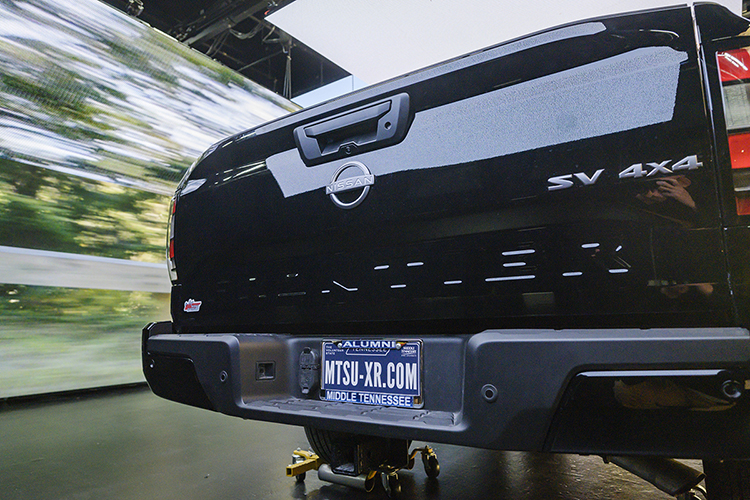
A custom license plate promotes MTSU’s new extended reality, or XR, stage, as footage of a speedy drive down a mountain road plays on an LED screen in the background during production of a “teaser” commercial in Nashville for the Department of Media Arts’ new facility, the only one of its kind at a Tennessee university. The XR stage, a new type of film and video production stage that will enable them to create projects anywhere, anytime, will be ready for MTSU classes this fall. (MTSU photo by Andy Heidt)
Their training will take place in the College of Media and Entertainment’s 2,800-square-foot Studio 1, which will be filled with LED screens that move, adjust and lock into any needed angle and position to create the look and feel the students want for their production.
An example of their work is available above and at http://MTSU-XR.com in an XR program-promoting video that features Pittard and Mike Forbes, the department’s assistant director for technical systems, as they seemingly zoom around a curving mountain road in a pickup truck … that’s actually sitting, parked, in the middle of an XR studio.
MTSU media students and faculty shot the video inside educational partner Monolith Studios’ Nashville XR facility earlier this spring. The only things truly zooming were the students as they rushed around filming the video outside the truck.
A behind-the-scenes video of the shoot at the MTSU-XR.com site shows the students working with Monolith’s XR equipment and facility, studying how the LED panels create light and imagery to perfectly simulate the desired effect.
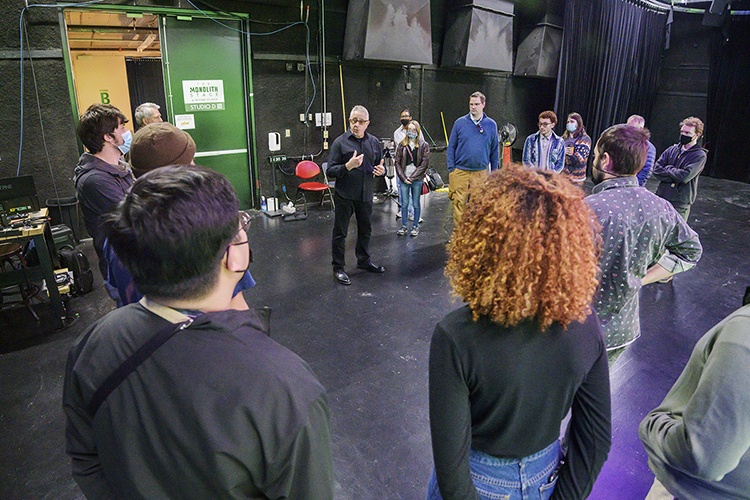
MTSU media students listen carefully to David Bennett, vice president of business development at Monolith Studios, before they begin production for a “teaser” commercial in Nashville for the Department of Media Arts’ new extended reality, or XR, stage, a new type of film and video production stage with high-resolution video screens that will enable them to create projects anywhere, anytime. Monolith Studios has advised MTSU on its new setup for its XR facility, the only one of its kind at a Tennessee university, which will be ready for classes this fall. (MTSU photo by Andy Heidt)
‘Years ahead of other universities’
XR technology is unique, the educators say, because users can create digital environments that look and behave like real three-dimensional spaces. Cameras used to shoot on the XR stage are equipped with motion-tracking devices, and as the camera moves, the video background on the LED walls changes accordingly.
MTSU’s XR stage will use Unreal Engine — the same software that allows users to navigate through 3D spaces on video games — to change the background image with the camera’s motion.

Mike Forbes
“Our students are all clamoring at the bit to get employment opportunities in the film industry,” says Forbes, another MTSU alumnus, who toured in the music industry for years setting up customized video wall installations for concerts — a skill he now teaches and one that MTSU’s taught since 2014 at the behest of companies needing a well-trained workforce.
“This is going to give our students a leg up on other recent graduates. They’re going to know this workflow; they’re going to know how to do things beyond what the camera captures, like being able to create environments and backgrounds and looks that other students from other universities are not going to have a background in. That’s because this technology is so new.
“We’re already years ahead of other universities, and that’s going to set our students apart from a lot of other programs,” Forbes adds.
Pittard says some of the skills students will learn for the new XR stage include set design and building, but they won’t need pencils, paint or hammers.
“If it were a traditional production with a real set, you would design the set and you would build it with real furniture and a real background in a real location and all that,” he says. “With this (XR) approach, you have a digital background, and it can be something that’s made entirely synthetically through 3D computer graphics.”
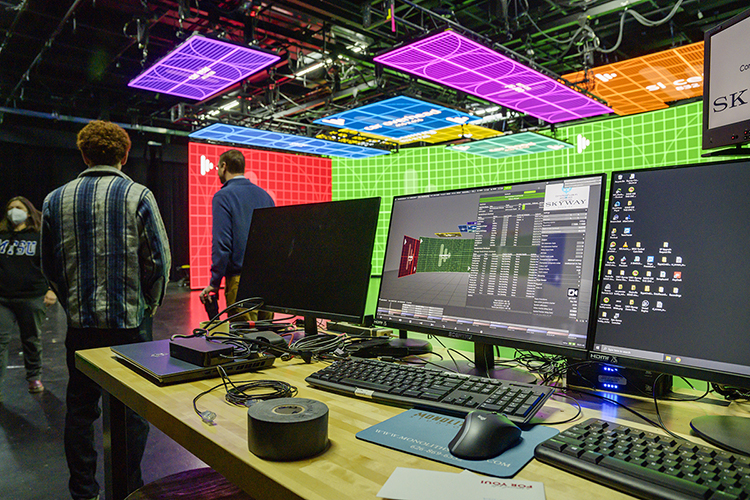
Multiple LED screens, controlled by the computers in the foreground, hang above and around the stage area in a Nashville studio in preparation for MTSU media students to begin production for a “teaser” commercial for the Department of Media Arts’ new extended reality, or XR, stage, a new type of film and video production stage that will enable them to create projects anywhere, anytime. The MTSU XR facility, the only one of its kind at a Tennessee university, will be ready for classes this fall. (MTSU photo by Andy Heidt)
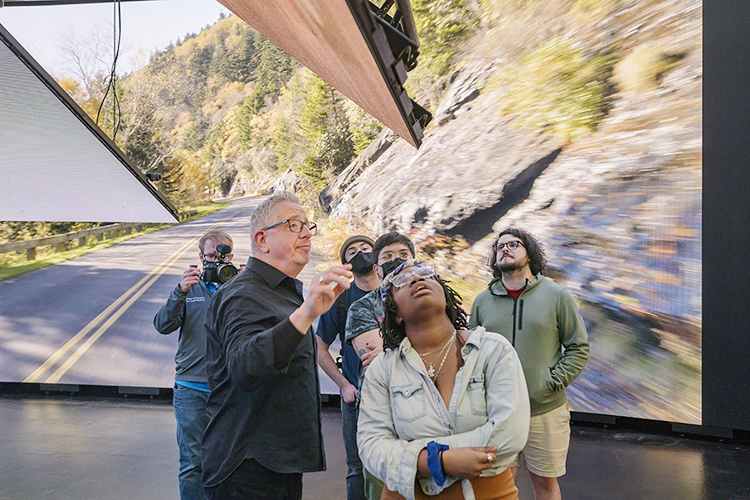
David Bennett, vice president of business development at Monolith Studios, talks with MTSU media students while footage from a mountain drive plays on an LED screen behind them during production for a “teaser” commercial in Nashville for the Department of Media Arts’ new extended reality, or XR, stage, a new type of film and video production stage that will enable them to create projects anywhere, anytime. Monolith Studios has advised MTSU on its new setup for its XR facility, the only one of its kind at a Tennessee university, which will be ready for classes this fall. (MTSU photo by Andy Heidt)
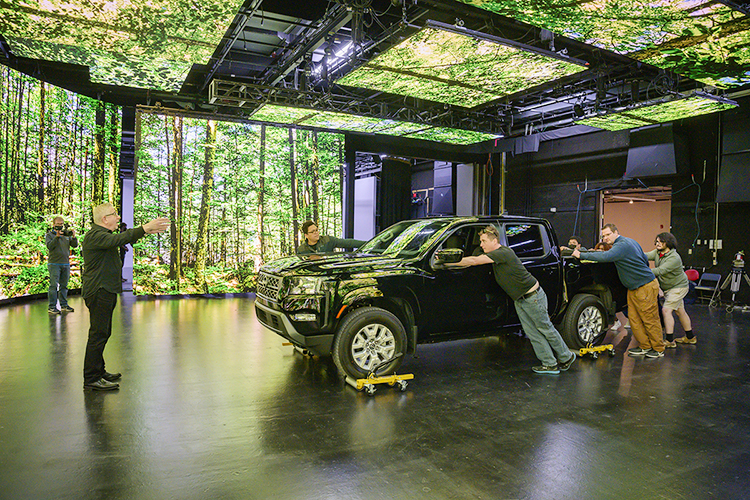
David Bennett, vice president of business development at Monolith Studios, guides MTSU media students during production for a “teaser” commercial in Nashville for the Department of Media Arts’ new extended reality, or XR, stage, a new type of film and video production stage that will enable them to create projects anywhere, anytime. Monolith Studios has advised MTSU on its new setup for its XR facility, the only one of its kind at a Tennessee university, which will be ready for classes this fall. (MTSU photo by Andy Heidt)
Students also can choose a real-life site and optically scan it to make a 3D digital model of that space with the visual surfaces mapped onto it.
“You can load that into the system and it will behave the same way as if you created a 3D model in a computer graphics program,” Pittard adds. “Not only can you do that, you can also merge the two of those things. It’s a time where you have just all kinds of flexibility.

Beverly Keel
“We’ll also be using a separate system for full-body motion capture that will allow amazing things, like a digital character interacting with a live actor on a virtual set. You’re limited only by your imagination.”
MTSU media dean Beverly Keel says the new XR stage “enhances our national reputation and takes the program to the next level.”
“I am so excited to see our students learn this cutting-edge technology and apply it to their own creativity to see what happens,” says Keel, another MTSU grad. “This broadens our students’ skill sets and will allow them to quickly emerge as leaders in the industry.”
New program, more partnerships
That flexibility is also extending into launching a new program for the Department of Media Arts that specializes in motion design, allowing students to earn a degree studying motion graphics, visual effects and virtual production.
 That expansion will allow the department to continue its successful partnerships with businesses across the industry, who’ve donated equipment, arranged internships and helped prepare the people they’ll need to work for them.
That expansion will allow the department to continue its successful partnerships with businesses across the industry, who’ve donated equipment, arranged internships and helped prepare the people they’ll need to work for them.
“This is what we do as a university, adopting this technology and saying, ‘Yeah, we’re going to make this happen for our students, and we’re going to invest in this for them,’” says Pittard.
“That’s really what I’m excited about, is to see the university say ‘OK, this is working, this is a success. Let’s build on that and let’s make it better.’”
To learn more about the new XR stage at MTSU, visit http://MTSU-XR.com. For more information on all the programs in MTSU’s Department of Media Arts, visit www.mtsu.edu/mediaarts.
To learn more about the College of Media and Entertainment and its programs, visit www.mtsu.edu/media.
— Gina E. Fann (gina.fann@mtsu.edu)
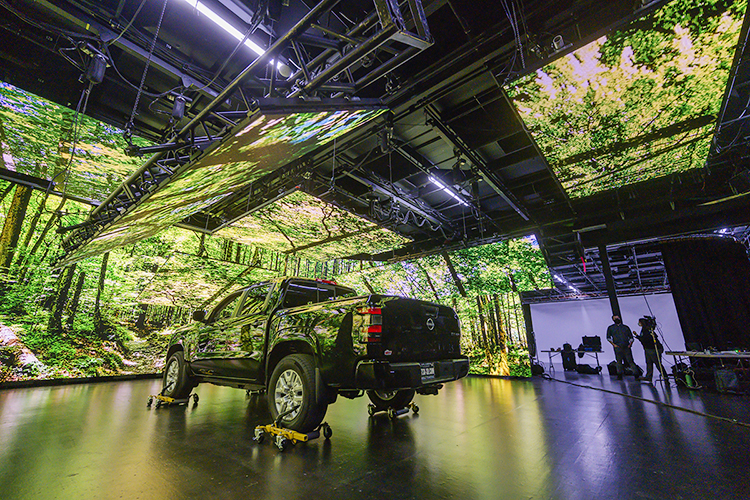
A forest scene displayed on multiple LED screens in a Nashville studio is reflected on a truck used by MTSU media students during production for a “teaser” commercial in Nashville for the Department of Media Arts’ new extended reality, or XR, stage, a new type of film and video production stage that will enable them to create projects anywhere, anytime. The MTSU XR facility, the only one of its kind at a Tennessee university, will be ready for classes this fall. (MTSU photo by Andy Heidt)
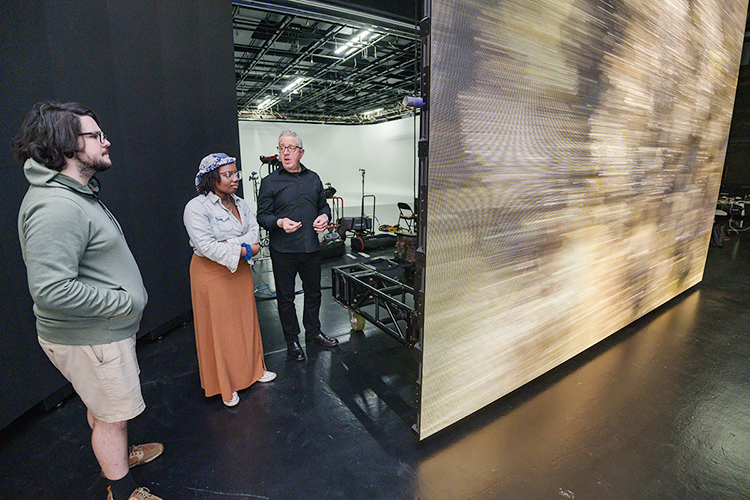
David Bennett, vice president of business development at Monolith Studios, talks with MTSU media students as footage of a speedy drive down a mountain road plays on an LED screen beside them during production for a “teaser” commercial in Nashville for the Department of Media Arts’ new extended reality, or XR, stage, a new type of film and video production stage that will enable them to create projects anywhere, anytime. Monolith Studios has advised MTSU on its new setup for its XR facility, the only one of its kind at a Tennessee university, which will be ready for classes this fall. (MTSU photo by Andy Heidt)
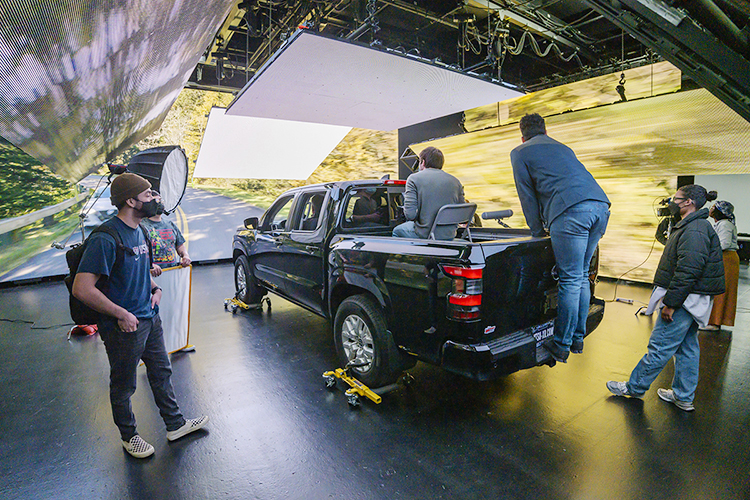
MTSU media students produce a “teaser” commercial in Nashville for the Department of Media Arts’ new extended reality, or XR, stage, a new type of film and video production stage that will enable them to create projects anywhere, anytime. The MTSU XR facility, the only one of its kind at a Tennessee university, will be ready for classes this fall. (MTSU photo by Andy Heidt)
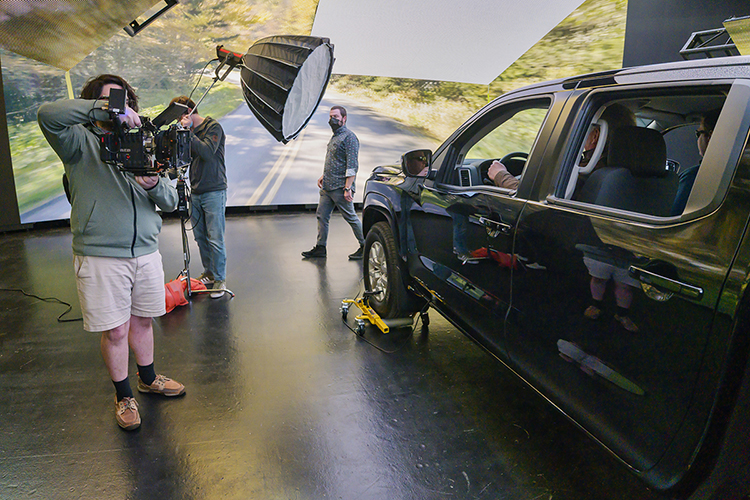
MTSU media students focus on the vehicle interior while producing a “teaser” commercial in Nashville for the Department of Media Arts’ new extended reality, or XR, stage, a new type of film and video production stage that will enable them to create projects anywhere, anytime. The MTSU XR facility, the only one of its kind at a Tennessee university, will be ready for classes this fall. (MTSU photo by Andy Heidt)

Billy Pittard, foreground, chair of MTSU’s Department of Media Arts, and Mike Forbes, assistant director for technical systems, laugh and wave for the camera while media students produce a “teaser” commercial in Nashville for the department’s new extended reality, or XR, stage, a new type of film and video production stage that will enable them to create projects anywhere, anytime. The MTSU facility, the only one of its kind at a Tennessee university, will be ready for classes this fall. (MTSU photo by Andy Heidt)

COMMENTS ARE OFF THIS POST